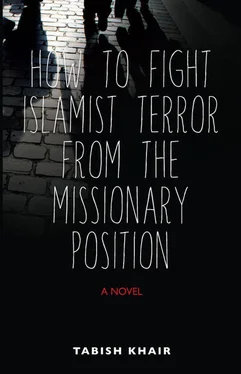Neither Ravi nor I had experienced a police station in India or Pakistan, except as something one drove past. But I am sure both of us associated uniformed people with authority. Even singly, a policeman or an army officer in Pakistan is a bit like a period: sentences stop or start around them. Here, they appeared to be not even a comma; they passed for just another alphabet, indistinguishable from the rest of us.
It was the normality of the place that struck me most. I mentioned this to Ravi while we waited on a bench, after speaking to a woman (was she a cop or a secretary?) at a counter. Ravi muttered some lines—sabse khatarnaak hota hai, murda shanti se bhar jaana, na hona tadap ka, sab sahan kar jaana, ghar se nikalna kaam par, aur kaam se lautkar ghar aana—in a monotone, but he did not say anything else. He was in a dour, uncommunicative mood.
After an initial interrogation by the officers in charge of the station, we were ushered into what looked like a secretary’s office, full of nondescript wooden furniture, replete with a tray holding cups, plastic flasks of coffee and tea (labeled) and a bowl of Danish butter cookies. There were even some tabloids and society magazines on a side table. We were then questioned, in greater detail, by two special officers, who did try to get Ravi to speak more at the beginning. But after getting all tied up in his laconic but factual replies—he said the Muslim prayers (Ravi was still “practicing,” which he omitted to mention) but no, he was a Hindu, etc.—they offered him a cup of coffee and decided to ignore him.
Of course, the police already knew about Karim’s Friday sessions: they had interrogated Ali, Ajsa and probably a few others. But they did not know of his sudden disappearances, his years in Cairo, his need for cash, the mystery caller.
They took my disclosures very seriously.
As I gave an account of our months in the flat, I felt convinced that we were doing the right thing. There was even a moment when I was amazed that we had not seen Karim in his true colors. The occasional secretiveness; the Quran club; the mystery disappearances. The times when he used my laptop: did he only surf for news? A narrow, religious man, intolerant of so many aspects of modernity, could there be any doubt as to his true affinities?
When we returned to the flat, after sharing a couple of silent drinks in a café, Karim had already been arrested. He had returned soon after we went to the police station, and the cops did not have any difficulty picking him up “for interrogation” on the basis of my declarations.
I was told later that they had picked Karim up even as we waited in the police station to sign the printed version of our statements. It must have happened quickly: the necklace of green-black beads and cigarette pouch that Karim always carried around had been abandoned on the kitchen table.
Ravi and I did not want to talk about it. I thought we had done the right thing, but it still felt wrong. Ravi was more affected than me. He murmured about how it all had started resembling the Black Plague years of European history, when the inability to find a reason for sickness and suffering had led to the widespread burning of Jews and strangers. Except that the invisible epidemic this time is capitalism, he grumbled, complicated by the fact that Europeans are accustomed to simply enjoying its advantages. Ravi had never shared my mistrust of Karim’s narrow religiosity. Perhaps, also, this was one break too many for him. He had cared deeply for Karim; he had loved Lena from the depths of his ironic soul.
But the flat still glared at us. The note on the fridge, listing in Karim’s neat handwriting all the things that had to be bought; the small TV in the kitchen; the coffee machine, which was there only for our use; the half-open door to Karim’s room, where his fraying sofa lay empty, sagging, shrouded with his pillows and blankets; the veiled bookrack; the suddenly silent phone in the lobby, the beads on the kitchen table. The flat accused us.
We decided to move out. I don’t think we even discussed it. We just started packing. Ravi had already booked his ticket to India: he was leaving in less than a month. He decided to leave his furniture—including the expensive bar—behind. If Karim does not want it, he can throw it out, he said.
We packed the rest of our things. Ravi gave most of his books away to the Clauses and Pernille; he packed them in two boxes and went up to Pernille’s flat with them. The next day we rented a storage unit and stored what had to be saved, mostly my furniture, threw out some things and, packing stuff for a week or so, moved into Cabinn.
I had left a curt note for Karim on the kitchen table, telling him that he could adjust this month’s rent against our deposit and keep whatever was left over. I had told him to call us on our mobiles if he had questions or differences. He never called.
When Ms. Marx discovered our relapse into Ravi’s old gypsy status, she invited us to sleep over at her place the next night.
Ravi got the spare room. I was finally forced to overcome my resistance to sharing her bed when her son was home; the only other option was a sagging sofa in her sitting room.
Yes, you have guessed right: I am still seeing Ms. Marx. I am fond of her son and have even fetched him from school once or twice. That is why I have not named her in this account. I think we are reasonably happy with our half glasses of love. Or I am, in any case. Sometimes I detect a look in her eyes that makes me feel that she is still hoping for something a bit more, and she knows that it cannot be between us. Sometimes I feel her straining against that knowledge.
I don’t. I like to hold her in bed; I find the tiny white—they are not blonde—hairs on her arms very sexy; I like the way her thighs, which she considers too thick, swell and fall into trim knees, the way, when she combs her dyed hair, her biceps—which she considers too muscular—jump; I love the dimple she gets when she laughs—which is not often, for she is a serious, busy woman—and I love the slight sag in her belly, left over from childbearing, that she is always trying but unable to get rid of. I love the way she straddles me when we make love, but refuses to let me look at her. I even love her preference for the missionary position.
I am grateful for all this and a hundred other small things. But I am also grateful for the knowledge that she can go on without me and I can continue without her; that, in due course, if required, we might both find our glasses more or less half-full with love for someone else. I will remember her, in that case, as I remember my MFA-girlfriend or my ex-wife, neither more nor less.
That makes me wonder about Ravi, while I sit here typing my version of those days. And about Lena, whom I have glimpsed only occasionally on the campus, smiling, controlled and poised… if Ravi was right about the green depths that hid in her. No, do not misunderstand me: people as accomplished and beautiful as Ravi and Lena always go on too. Of course they will have other relationships. What choice do they have in that matter? I have no doubt of their perseverance. But will a half glass ever suffice for them? A predictable Eng Lit line comes back to me: After such knowledge, what forgiveness?
How Ravi would have scoffed at this quotation. “Fuck, yaar,” I hear him laugh. “You Eng Lit types crack me up!”
But let me heed my MFA-girlfriend’s advice, this once, and avoid digressions at such a crucial juncture of my account. Let us return to the infamous Islamist Axe Plot.
Like most plots, its tail was twisted, but such twists inevitably become evident only in the end. We slept late the next morning at Ms. Marx’s place; by the time we woke up, around nine, she had already dropped her son off at school and picked up fresh bread from a bakery. We had a leisurely breakfast. Ms. Marx and I were teaching later that day; we drove off together. Ravi stayed back. I noticed that he had stopped fiddling with his mobile.
Читать дальше












